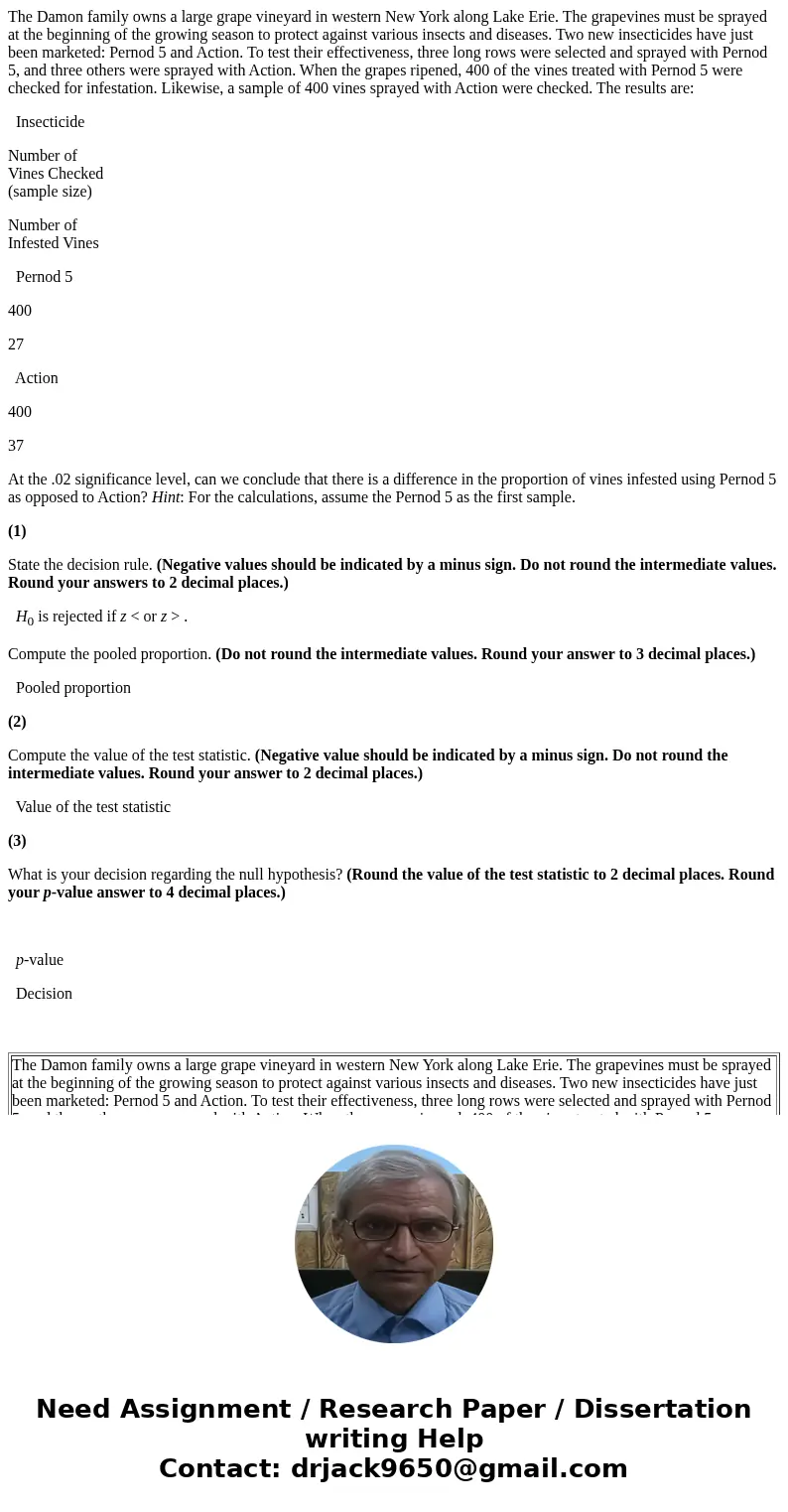The Damon family owns a large grape vineyard in western New
The Damon family owns a large grape vineyard in western New York along Lake Erie. The grapevines must be sprayed at the beginning of the growing season to protect against various insects and diseases. Two new insecticides have just been marketed: Pernod 5 and Action. To test their effectiveness, three long rows were selected and sprayed with Pernod 5, and three others were sprayed with Action. When the grapes ripened, 400 of the vines treated with Pernod 5 were checked for infestation. Likewise, a sample of 400 vines sprayed with Action were checked. The results are:
Insecticide
Number of
Vines Checked
(sample size)
Number of
Infested Vines
Pernod 5
400
27
Action
400
37
At the .02 significance level, can we conclude that there is a difference in the proportion of vines infested using Pernod 5 as opposed to Action? Hint: For the calculations, assume the Pernod 5 as the first sample.
(1)
State the decision rule. (Negative values should be indicated by a minus sign. Do not round the intermediate values. Round your answers to 2 decimal places.)
H0 is rejected if z < or z > .
Compute the pooled proportion. (Do not round the intermediate values. Round your answer to 3 decimal places.)
Pooled proportion
(2)
Compute the value of the test statistic. (Negative value should be indicated by a minus sign. Do not round the intermediate values. Round your answer to 2 decimal places.)
Value of the test statistic
(3)
What is your decision regarding the null hypothesis? (Round the value of the test statistic to 2 decimal places. Round your p-value answer to 4 decimal places.)
p-value
Decision
| The Damon family owns a large grape vineyard in western New York along Lake Erie. The grapevines must be sprayed at the beginning of the growing season to protect against various insects and diseases. Two new insecticides have just been marketed: Pernod 5 and Action. To test their effectiveness, three long rows were selected and sprayed with Pernod 5, and three others were sprayed with Action. When the grapes ripened, 400 of the vines treated with Pernod 5 were checked for infestation. Likewise, a sample of 400 vines sprayed with Action were checked. The results are: |
Solution
I have solved this question earlier with different figures. Please workout using yours figures. If you need any further help just PM me. If I have helped you please rate me 5 stars first (before you rate anyone else)
The Damon family owns a large grape vineyard in western New York along Lake Erie. The grapevines must be sprayed at the beginning of the growing season to protect against various insects and diseases. Two new insecticides have just been marketed: Pernod 5 and Action. To test their effectiveness, three long rows were selected and sprayed with Pernod 5, and three others were sprayed with Action. When the grapes ripened, 400 of the vines treated with Pernod 5 were checked for infestation. Likewise, a sample of 400 vines sprayed with Action were checked. The results are
Insecticides # of vines checked sample size #of infected vines
Pernod 5 400 29
Action 400 38
--------------------------------------------------------------------------------
At the .02 significance level, can we conclude that there is a difference in the proportion of vines infested using Pernod 5 as opposed to Action? Hint: For the calculations, assume the Pernod as the first sample.
(1) State the decision rule. (Negative amounts should be indicated by a minus sign. Do not round the intermediate values. Round your answers to 2 decimal places.)
H0 is rejected if z < or z > .
Compute the pooled proportion. (Do not round the intermediate values. Round your answer to 3 decimal places.)
Pooled proportion
(2) Compute the value of the test statistic. (Negative amount should be indicated by a minus sign. Do not round the intermediate values. Round your answer to 2 decimal places.)
Value of the test statistic
(3) What is your decision regarding the null hypothesis? (Round your p-value answer to 4 decimal places.)
p value=
Answer
Pernod 5: n1= 400, p1=29/400=0.0725
Action: n2= 400, p2=38/400= 0.095
-----------------------------------------------------------------------------
1. The test hypothesis is
Ho:p1-p2=0
Ha:p1-p2 not equal to 0
Given a=0.02, the critical value is Z(0.01)= -2.33 (check standard normal table)
H0 is rejected if z <-2.33 or z >2.33 .
Pooled proportion= (29+38)/(400+400)=0.084
-----------------------------------------------------------------
2. The test statistic is
Z=(p1-p2)/?[p*(1-p)*(1/400 + 1/400)]
=(0.0725-0.095)/sqrt(0.084*(1-0.084)*2/400)
= -1.15
--------------------------------------------------------------------
3. The p-value is 2*P(Z<-1.15)= 0.2501 (check standard normal table)
Since the p-value is larger than a=0.02, we do not reject Ho.



 Homework Sourse
Homework Sourse